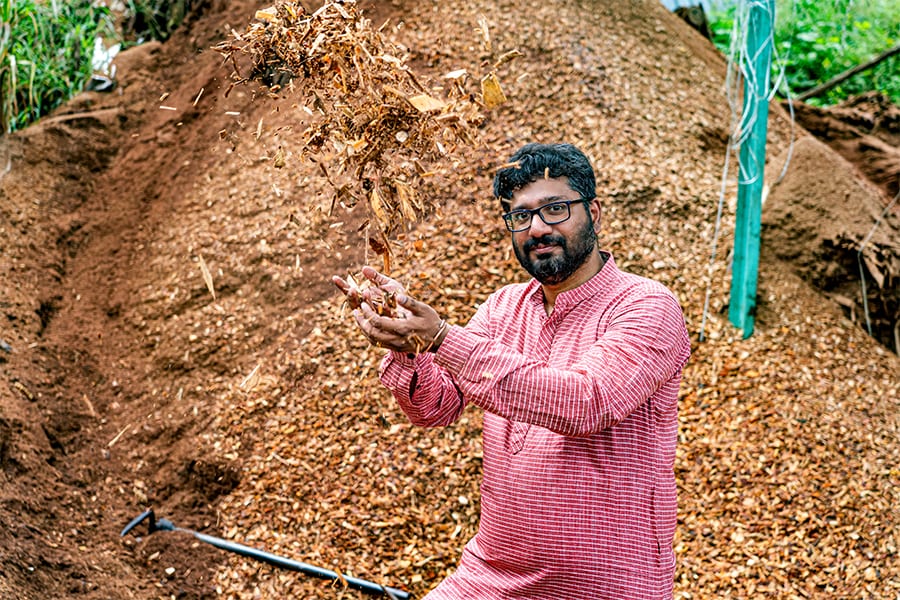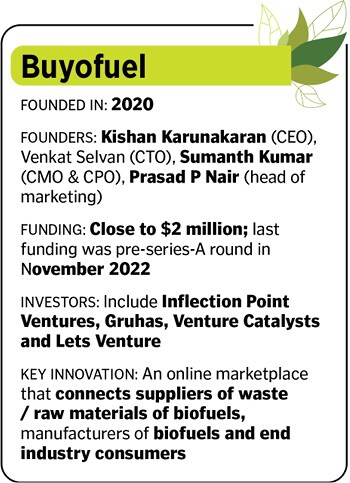
Buyofuel: Making biofuel connections
There is a government push for biofuels adoption, but companies will not transition away from fossil fuels until they have a clear visibility on biofuel supply, which is currently fragmented. Buyofuel, an online B2B marketplace, wants to bridge these gaps
Image: Arun Chandrabose for Forbes India Buyofuel CEO, Kishan Karunakaran at a wood chips factory in Perumbavoor, Kerala
Buyofuel CEO, Kishan Karunakaran at a wood chips factory in Perumbavoor, Kerala
Kishan Karunakaran says that his entry into the biofuels space was purely coincidental. In 2007-08, cultivation of a crop called Jatropha curcas was becoming famous in India for production of biodiesels, advocated even by former President of India Dr APJ Abdul Kalam. The grandson of a farmer, Kishan decided to cultivate the crop. The idea was to sell it to biofuel manufacturers, but there was no demand. They decided to get into manufacturing themselves. “I set up one of India’s earliest commercial scale biodiesel plant, and ran my own manufacturing unit till 2014,” he says. They had to soon shut shop for various reasons: They realised that the crop Jatropha curcas was not a viable option for biofuels, and both demand and supply was extremely fragmented. “Clients were big but the supply was small,” he says.
In 2018, the Indian government launched the National Policy of Biofuels to reduce India’s dependence on imports and improve local manufacturing of biofuels. This time around, Kishan, along with friends Venkat Selvan, Sumanth Kumar and Prasad P Nair, decided to plug the gaps across the value chain using technology and a mobile platform. “We wanted the platform to help fragmented suppliers of waste [that can be used as raw materials for biofuels] to connect with biofuel manufacturers easily, and also supply these biofuels to large fuel consumers,” says Kishan. They launched Buyofuel in 2020, which they call India’s first B2B marketplace for buying and selling both biofuels and raw materials to make biofuels.
 There are three main stakeholders that Buyofuel seeks to connect: First, suppliers of waste like used cooking oil, tyre/rubber waste, agro waste, wet organic waste, saw dust and plastic waste that can be used as raw materials to make biofuels. Second, manufacturers of solid, liquid and gaseous biofuel. Third, end consumers like factories or industries that can replace their petrol, diesel and coal requirements with bio-alternatives.
There are three main stakeholders that Buyofuel seeks to connect: First, suppliers of waste like used cooking oil, tyre/rubber waste, agro waste, wet organic waste, saw dust and plastic waste that can be used as raw materials to make biofuels. Second, manufacturers of solid, liquid and gaseous biofuel. Third, end consumers like factories or industries that can replace their petrol, diesel and coal requirements with bio-alternatives.
Examples of solid biofuels—typically used by industrial boilers as an alternative to coal—available on the platform include loose biomass, biomass briquettes and pellets. Liquid biofuels, a prospective replacement for fossil fuels based on petroleum, on the platform include biodiesel, bio LDO (plastic oil), bio ethanol and bio-FO (tyre oil). Gaseous biofuels available on the platform include bio CNG and green hydrogen.
It is easier for companies to source fossil fuels since the supply is more consistent and organised, there is an assurance of quality, and transactions are transparent and simple, Kishan says, adding that Buyofuel is trying to build the same ecosystem for biofuels. “First, we want to aggregate and curate suppliers in terms of quantity. Second, offer a quality assurance. Third, being a tech platform, we want to give an end-to-end visibility from enquiry to doorstep delivery, thereby making it as easy to carry out these transactions as in the case of fossil and conventional fuels.” All transactions are done online on the platform. There is no subscription fee, and revenue earned by the startup is through sales.








